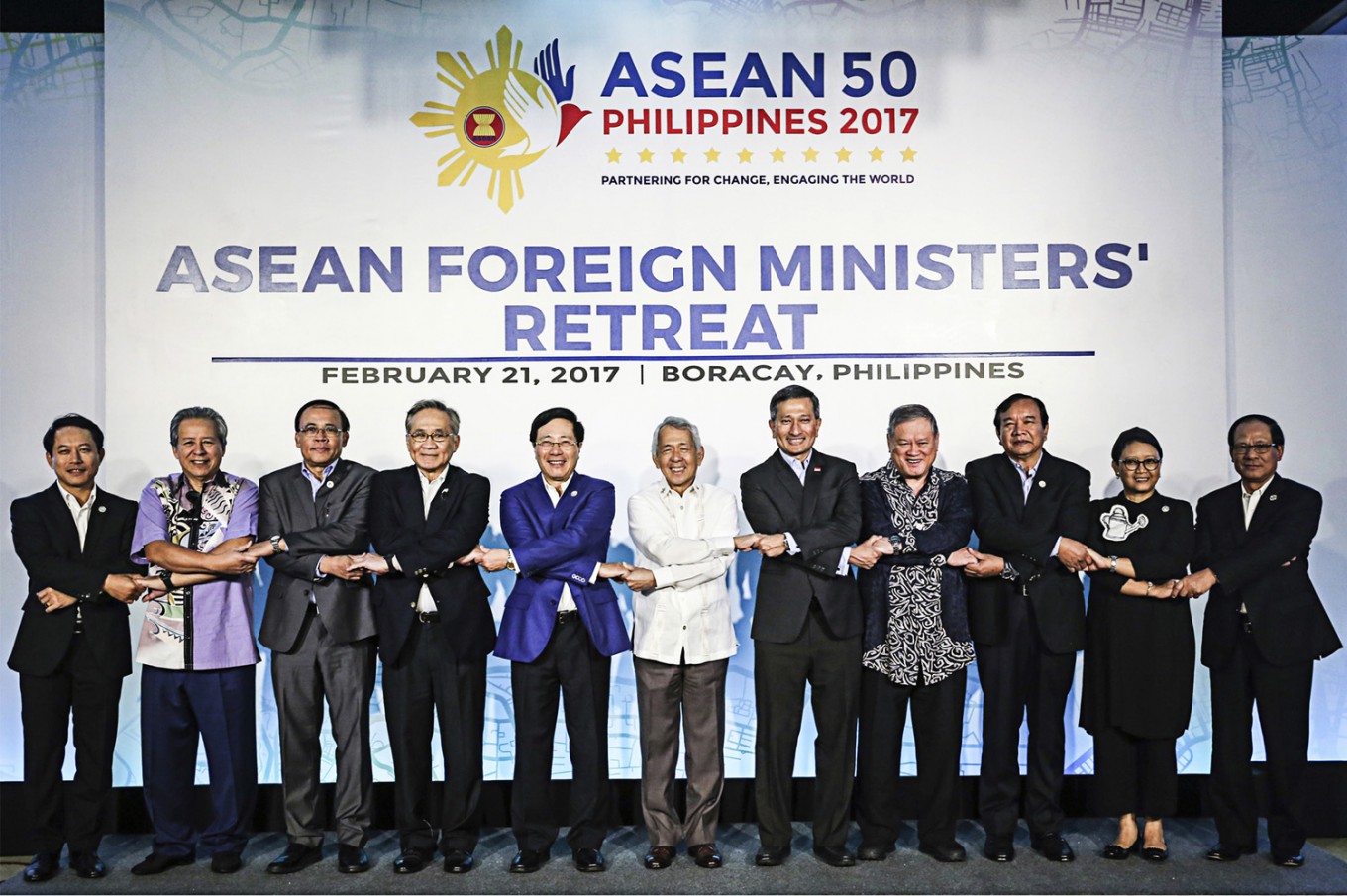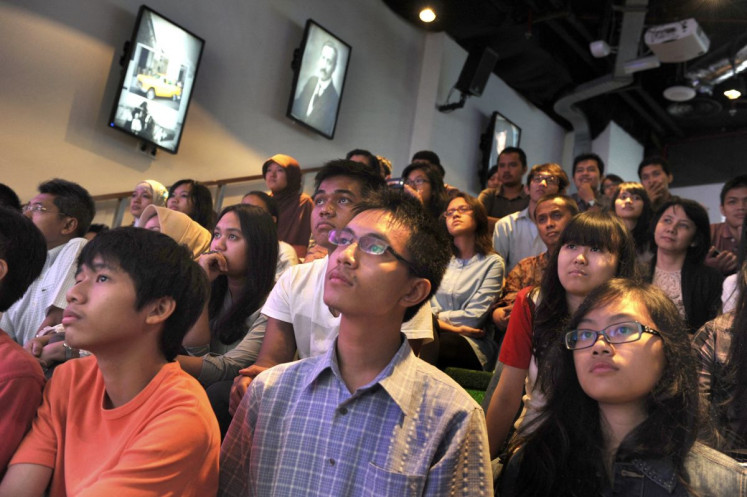Popular Reads
Top Results
Can't find what you're looking for?
View all search resultsPopular Reads
Top Results
Can't find what you're looking for?
View all search resultsStrategic imperatives for Indonesia’s foreign policy
Change text size
Gift Premium Articles
to Anyone
 In this photo provided by Presidential Communications Operations Office ASEAN, Foreign ministers from the Association of South East Asian Nations (ASEAN) link arms during the ASEAN Foreign Ministers' Retreat in Boracay, Aklan province, central Philippines, on Feb. 21. From left, Laos' Foreign Minister Saleumxay Kommasith, Malaysia's Foreign Minister AnifH Aman, Myanmar's Minister of State for Foreign Affairs U Kyaw Tin, Thailand's Foreign Minister Don Pramudwinai, Vietnam's Foreign Minister Pham Binh Minh, AMM Retreat Chair and Philippine Secretary of Foreign Affairs Perfecto Yasay, Singapore's Foreign Minister Vivian Balakrishnan, Brunei Darussalam's Minister at the Prime Minister's Office and Second Minister of Foreign Affairs and Trade Pehin Dato' Lim Jock Seng, Cambodia's Senior Minister and Minister for MFAIC Prak Sokhonn, Indonesia's Foreign Minister Retno Marsudi, and ASEAN Secretary-General, ASEAN Secretariat Le Luong Minh. (Presidential Communications Operations Office ASEAN via AP/File)
In this photo provided by Presidential Communications Operations Office ASEAN, Foreign ministers from the Association of South East Asian Nations (ASEAN) link arms during the ASEAN Foreign Ministers' Retreat in Boracay, Aklan province, central Philippines, on Feb. 21. From left, Laos' Foreign Minister Saleumxay Kommasith, Malaysia's Foreign Minister AnifH Aman, Myanmar's Minister of State for Foreign Affairs U Kyaw Tin, Thailand's Foreign Minister Don Pramudwinai, Vietnam's Foreign Minister Pham Binh Minh, AMM Retreat Chair and Philippine Secretary of Foreign Affairs Perfecto Yasay, Singapore's Foreign Minister Vivian Balakrishnan, Brunei Darussalam's Minister at the Prime Minister's Office and Second Minister of Foreign Affairs and Trade Pehin Dato' Lim Jock Seng, Cambodia's Senior Minister and Minister for MFAIC Prak Sokhonn, Indonesia's Foreign Minister Retno Marsudi, and ASEAN Secretary-General, ASEAN Secretariat Le Luong Minh. (Presidential Communications Operations Office ASEAN via AP/File)
T
he presidential election is over, even though the final results will have to wait for the decision by the Constitutional Court by the end of June. It is time to start planning for the next five years.
One area that needs careful thinking and debate is foreign policy. It is time for Indonesia, after a focus on strengthening national capacity (economic development) for almost five years, to start deepening its regional and international engagement.
That should start with an understanding that Indonesia’s foreign policy must be based on a solid foundation and carried out to shape, manage and respond to the ever-changing external environment in a manner that would effectively advance our strategic national interests.
The foundation of our foreign policy is given. Indonesia will never deviate from key principles of foreign policy. Those principles oblige the country to conduct a foreign policy that upholds the bebas-aktif (free and active) principle and plays a role as an active participant in pursuing international peace. No administration in Indonesia could afford to depart from these key and fundamental requirements.
Indonesia’s long-term strategic interests for the next few decades are relatively fixed. Defending sovereignty, maintaining territorial integrity, pursuing people’s welfare and ensuring stability in Southeast Asia will continue to be Indonesia’s core national interests. However, strategic priorities, especially within the short and medium term, might change in accordance to challenges the country faces. Five imperatives are in order.
First, Indonesia’s greatest strategic challenge for the next five to 10 years would be the imperative of positioning itself within the growing rivalry between the United States and China.
We often say we will not take sides in that rivalry. We also hope we don’t have to choose between the two superpowers. Yet, intention and hope are not policy. We need to actively create conditions that would ensure our strategic autonomy.
It is imperative for Indonesia to create ballast that will prevent us from being pulled into the rivalry. That ballast should take the form of a regional order that combines norms, institutions and a balance of power.
Second, that imperative requires a full and coherent implementation of the Global Maritime Fulcrum (GMF) as a strategic framework for foreign policy. As President Joko “Jokowi” Widodo declared, “we will put forward Indonesia’s identity as a maritime nation and an archipelagic state.”
We should continue to (1) defend our maritime sovereignty and sovereign rights, (2) protect our marine resources, (3) ensure security and safety of our seas, (4) work with our neighbors to resolve both maritime and land boundaries, (5) play an active role in finding solutions to the South China Sea dispute and (6) support international efforts to ensure good order at sea.
We should do this through the implementation of the United Nations Convention on the Law of the Sea (UNCLOS), maritime diplomacy, naval enhancement and regional maritime cooperation.
Third, the GMF needs to be implemented within a maritime outlook that recognizes two strategic oceans around us — the Pacific and Indian Ocean — as a single geopolitical and geoeconomic unit. Indonesia should integrate the two oceans as the focus of foreign policy.
Whether it is called the Indo-Pacific or the Pacific and Indian Ocean (PACINDO) region, this maritime common area will become a theater where the pursuit of power and welfare will take place for the rest of the 21st century. The construction of an inclusive ASEAN-centered Indo-Pacific outlook constitutes a first step in that direction.
Fourth, the implementation of the GMF concept and the construction of an Indo-Pacific outlook will require Indonesia to work closely with key major and middle powers in the region. We need to strike a balanced engagement with the US, China, Japan, Russia and India, and deepen our relationship with Australia and South Korea. As the Indo-Pacific is fast becoming the center of gravity of global politics, these are the countries that matter the most for the future of the region.
Finally, it is imperative to see ASEAN as key strategic capital for Indonesia’s foreign policy. Efforts to strengthen ASEAN need to be intensified, so that ASEAN’s centrality and relevance do not fade away amid strategic transformation taking place in the region.
One feasible way to ensure this is by putting forward fresh ideas on how the East Asia Summit (EAS), as an ASEAN-led institution, could be transformed into a premier regional institution capable of ensuring regional security and delivering prosperity to all parties.
Strategic changes in the region are taking place at an unprecedented speed. If not managed carefully, the implications of those changes could be devastating for the region. Indonesia and ASEAN need to work fast to find a common ground to address them.
***
The writer is the Indonesian ambassador to the United Kingdom, Ireland and the International Maritime Organization (IMO). The views expressed are his own.










